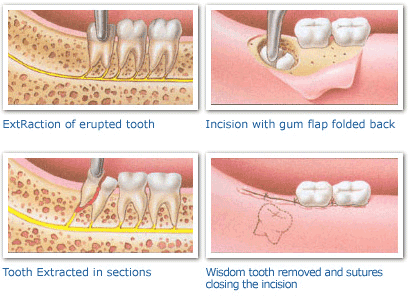60+ Years Experience
Providing dental care in London for over 60 years
Finance Plans Available
Spread the cost of your treatment with interest-free payments
Central London Location
Located in the heart of London with excellent transport links
Long Term UCL Partnership
Full affiliation & long-term partnership with UCL
What are Wisdom Teeth?
As wisdom teeth are the last permanent teeth to come through there is often not enough room left in your mouth to accommodate them. This can lead to impacted wisdom teeth – teeth that are trapped beneath the gum tissue by other teeth or bone. If teeth are impacted, swelling and tenderness of the gum may occur and antibiotics may be prescribed to ease the inflammation.
This condition is called acute pericoronitis.
Wisdom teeth that only partially emerge or come through crooked may also lead to painful crowding and disease. Food and bacteria can get trapped around the edge of the wisdom tooth, causing a build-up of plaque, which can lead to tooth decay, gum disease, cellulitis or other problems.
Since teeth removed before the age of 20 have less developed roots and fewer complications, you should consult our dentist in London dentist to have your wisdom teeth evaluated to see if they need to be removed, especially is they have started to cause problems.
How are Wisdom Teeth Removed?

ExcellentBased on 258 reviews
 Alex Brittain2024-06-07Great dentist.
Alex Brittain2024-06-07Great dentist. William Smart2024-05-29Naturally, I was not looking forward to the extraction of a wisdom tooth in the highest of spirits but Doctor Jill made the occasion an underwhelming and pain-free event for which I am very grateful. I would not hesitate to recommend the Dental Centre having received a high quality of care and service over many years since I was a UCL undergraduate.
William Smart2024-05-29Naturally, I was not looking forward to the extraction of a wisdom tooth in the highest of spirits but Doctor Jill made the occasion an underwhelming and pain-free event for which I am very grateful. I would not hesitate to recommend the Dental Centre having received a high quality of care and service over many years since I was a UCL undergraduate. Xiaoyu Liu2024-04-10Gemma is one of the best hygienist I’ve met here! She is very patient, friendly, and very caring.
Xiaoyu Liu2024-04-10Gemma is one of the best hygienist I’ve met here! She is very patient, friendly, and very caring. Joseph C2024-02-07Brilliant experience from start to finish. I'd been having tooth pain for a couple of weeks and managed to book an appointment the next day after finding them. Reception team was really friendly and welcoming, and Dr Hussein who I saw first of explained everything brilliantly and made sense of what was going on. I was given the choice of a root canal or having my tooth removed, and was advised on costs and pros/cons to both. I chose to have a tooth removal and was booked in with Dr Jill the following day. I'd never had a tooth removed and so was a little nervous but both Dr Jill and her assist put me at ease and I felt relaxed instantly. I was amazed at how quick and painless it all was, I honestly didn't feel a thing and was surprised how quick it took. Definitely recommend The Dental Centre and can't thank them enough for their professionalism and care.
Joseph C2024-02-07Brilliant experience from start to finish. I'd been having tooth pain for a couple of weeks and managed to book an appointment the next day after finding them. Reception team was really friendly and welcoming, and Dr Hussein who I saw first of explained everything brilliantly and made sense of what was going on. I was given the choice of a root canal or having my tooth removed, and was advised on costs and pros/cons to both. I chose to have a tooth removal and was booked in with Dr Jill the following day. I'd never had a tooth removed and so was a little nervous but both Dr Jill and her assist put me at ease and I felt relaxed instantly. I was amazed at how quick and painless it all was, I honestly didn't feel a thing and was surprised how quick it took. Definitely recommend The Dental Centre and can't thank them enough for their professionalism and care. Alessandro Alfa2024-02-02Awesome experience to be treated at the Dental Centre! The team is very professional and caring, from the receptionists to hygienist to the manager. The facilities are modern and neat and the operations are very well organised. I had my dental hygiene with Dovile, who gave me the best treatment I ever received: gentle, accurate, and thorough. Plus, she gave me good tips to improve my oral health I've been overlooking in the past couple of years. I'll definitey return to the Dental Centre, now my only reference dental practice!
Alessandro Alfa2024-02-02Awesome experience to be treated at the Dental Centre! The team is very professional and caring, from the receptionists to hygienist to the manager. The facilities are modern and neat and the operations are very well organised. I had my dental hygiene with Dovile, who gave me the best treatment I ever received: gentle, accurate, and thorough. Plus, she gave me good tips to improve my oral health I've been overlooking in the past couple of years. I'll definitey return to the Dental Centre, now my only reference dental practice!

